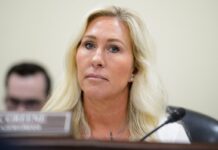
WASHINGTON (GA Recorder) — New Hampshire and Georgia will have a bit longer to implement key changes to when and how they hold Democratic presidential primaries under an extension a Democratic National Committee panel approved Wednesday.
Election officials will have until June 3 to move New Hampshire’s 2024 Democratic presidential primary to Feb. 13 and Georgia’s to Feb. 20 if they want to hold early primaries next year.
New Hampshire must also expand access to early voting if it wants to remain one of the first states in the country that votes on Democratic presidential candidates.
The DNC panel in December shook up the longstanding caucus and primary calendar and decided voters in South Carolina would go first in picking Democratic presidential nominees, followed by Nevada, New Hampshire, Georgia and Michigan.
The proposal would move the earliest date away from the longtime first-in-the-nation Iowa caucuses, though New Hampshire would maintain an early role and vote just a week after South Carolina.
GOP state leaders opposed
The extension, the Rules & Bylaws Committee approved Wednesday following a 25-0 vote during a virtual meeting, gives New Hampshire and Georgia several months to make their primary election changes beyond an original Jan. 5 deadline, though the additional time is unlikely to sway GOP state leaders, who remain opposed to the changes.
Secretary of State Brad Raffensperger, who has the authority to set the calendar, has yet to endorse the shift. And the Democrats’ plan was dealt a setback when Gov. Brian Kemp’s administration announced in early January he won’t back the switch.
That factor has elicited concerns from New Hampshire Democrats who are imploring the committee to work with them, given the GOP governor and Republican-controlled state legislature have rebuffed cooperating with Democrats to implement changes to state law.
“I want to be very clear about one thing — we share the president’s and the RBCs commitment to elevating the voices of Black, Latino and Hispanic voters,” said panel member Joanne Dowdell of New Hampshire. “And we believe it’s possible to lift up diverse voices and keep New Hampshire at the start of the process. These two things need not be mutually exclusive.”
“We agree that our goal with the early primary window shouldn’t just be to tell the story of one state or a single group of voters, it should be to tell the broader story of our party — both our values and our ability to appeal to voters all across the country,” Dowdell added.
The new requirements for New Hampshire to remain an early primary state, she said, put the state’s Democrats in a “no-win position.”
If New Hampshire and Georgia don’t make the adjustments, they would need to hold their Democratic presidential primaries in the regular window, which runs from the first Tuesday in March through the second Tuesday in June.
If the states opt to hold their primary elections outside that window without the waiver, they could face repercussions from the national party, including a prohibition on Democratic presidential candidates campaigning in the state and the state losing half its delegates.
Frustration with New Hampshire
Several members of the Rules and Bylaws Committee voiced frustration with some New Hampshire Democrats during the meeting, arguing that some comments being made publicly are harmful to the party.
Leah Daughtry, a panel member representing New York, said it was incumbent on the committee to “set up a calendar that reflects a 21st-century voting reality, as opposed to something that happened 100 years ago.”
Daughtry said she was “taken aback and quite frankly shocked” by some New Hampshire Democrats saying they were surprised by the panel’s decision to re-work the order of states that get waivers to hold their primary elections early in the process.
“Hanging their argument on this 100-year-old privilege is really, for me as an African American woman, quite disturbing in as much as this law that they passed was passed even before Black people had the right to vote,” Daughtry said, adding it was also before women had the right to vote.
Mo Elleithee, representing the District of Columbia on the committee, sought to remind New Hampshire that the state would still hold the second voting day in the process.
“Even I, as a veteran of several New Hampshire primaries, have to admit, like this notion that New Hampshire is first in the nation is a bit of a fallacy,” he said. “New Hampshire has historically been second in the nation behind Iowa. That has been its role.”
Elleithee said he understands that Iowa is technically a caucus and that New Hampshire state law says the state’s primary election must be the first of its kind, though he challenged the distinction.
“Let’s be real … it has been viewed as the second-in-the-nation contest,” Elleithee said. “Based on our proposal, it is still the second-in-the-nation contest. We have maintained the tradition that New Hampshire has asked us to maintain.”
December vote
The DNC Rules & Bylaws panel voted in December to change the order and the states that are granted waivers to hold primaries early in the year, moving slightly away from Iowa, New Hampshire, Nevada and South Carolina as the early states.
The new lineup for 2024 would have South Carolina vote first on Feb. 6, followed by Nevada and New Hampshire on Feb. 13, Georgia on Feb. 20 and Michigan on Feb. 27.
President Joe Biden, who in 2020 didn’t win a primary until South Carolina, had requested the shift in the party’s presidential nomination process.
The changes were approved on a mostly unanimous voice vote, though Scott Brennan of Iowa and Dowdell voted against the new primary calendar.
Election officials in several of the states and Iowa have rebuked the decision, saying they simply won’t change when the state holds its primaries. Iowa and New Hampshire also have state laws requiring them to vote before other states, complicating the matter.
Rules and Bylaws Committee Co-Chair Minyon Moore said during the Wednesday meeting the panel remained “committed to seeing” Biden’s vision for the 2024 primary move forward.
“We want to make sure the states have as much time as they need to work through this process,” Moore said.
“South Carolina, Nevada and Michigan have all completed their waiver requirements to our satisfaction,” she noted. “New Hampshire and Georgia remain working on their progress. Albeit it is for different reasons, but we are still committed to seeing the president’s vision and we want to make sure the states have as much time as they need to work through this process.”






